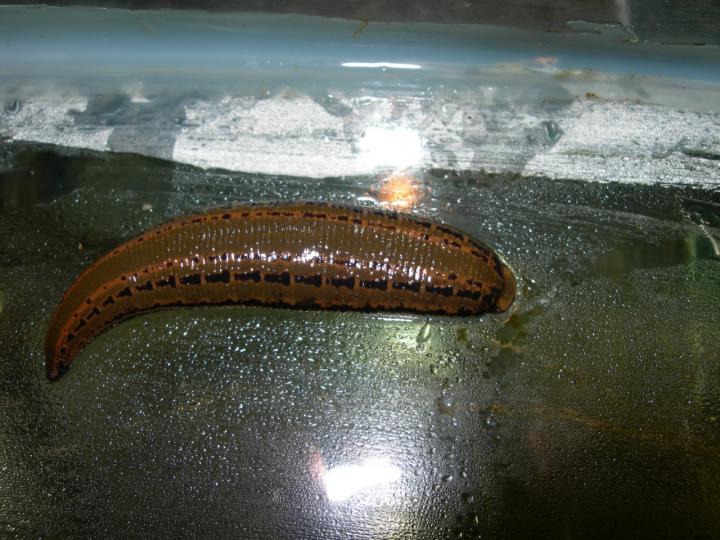Study offers new insights into the powerful anticoagulants contained in the saliva of leeches most often used in medical practice.

Credit: Sebastian Kvist
TORONTO, ON – JUNE 2020 – The results of new research published this week in Scientific Reports reveal insights that may have profound effects on the use of medicinal leeches in hospital-based medicine.
An international team of researchers, led by Royal Ontario Museum (ROM) scientist Sebastian Kvist, have announced the completion and results of their work to sequence the genome of Hirudo medicinalis, a European leech, and one of the most prominently used medicinal species.
The team focused on the diversity of blood thinners–or anticoagulants–contained within the genome, generating results that may have profound effects on how blood-sucking organisms are used in hospital settings.
Medicinal leeches have long been used to treat various human conditions. However, their use in pre-modern medicine was based on early, unfounded theories of healing–primarily, that human body function relied on the balance of the four “humors”: blood, phlegm, black bile and yellow bile. Draining a patient’s blood, often by applying live leeches, was thought to restore that balance.
Today, two leech species–Hirudo verbana and Hirudo medicinalis–are used for healing practices based soundly in science, primarily for the replantation of digits (e.g. fingers) or skin grafting surgery. Their saliva contains the strongest blood thinners known to medicine and can relieve the buildup of blood after surgery and promote the healing of blood vessels. However, the full complement of compounds in medicinal leech saliva that achieve this outcome was not known until now.
“Incredibly, the leech uses 15 different proteins known to negatively affect the blood-clotting mechanism in vertebrates, and 17 other proteins that are likely also part of the same anti-clotting process,” says Kvist, Curator of Invertebrates at the ROM, a cross-appointed professor at the University of Toronto, and the lead curator of the award-winning ROM original exhibition Bloodsuckers: Legends to Leeches.
“This is far more than we anticipated, and the insights generated by this research will allow medical professionals to better understand how and when to use leeches in their practice,” he adds.
As only the third leech genome ever sequenced, Hirudo medicinalis provides important comparative data for understanding the evolution of bloodfeeding in leeches, notes the paper’s senior author, Mark Siddall, Curator of Annelida and Protozoa at the American Museum of Natural History in New York City.
“It is astonishing that the most utilized, well-known and famous leech species in the world had not been investigated at this level,” says Siddall. “This research provides critical insight into the evolution of bloodfeeding in leeches and will play an important role in future research.”
###
In sequencing the genome, Kvist and Siddall were joined by Alejandro Manzano-Marín (DoME, University of Vienna), Danielle de Carle (Royal Ontario Museum and the University of Toronto, Canada), and Peter Trontelj (the University of Ljubljana, Slovenia).
Reference: Kvist, S., Manzano-Marín, A., de Carle, D., Trontelj, P. & Siddall, M.E. Draft genome of the European medicinal leech Hirudo medicinalis (Annelida: Clitellata: Hirudiniformes) with emphasis on anticoagulants. Scientific Reports, In press.
Media Contact
Sebastian Kvist
[email protected]
Related Journal Article
http://dx.




